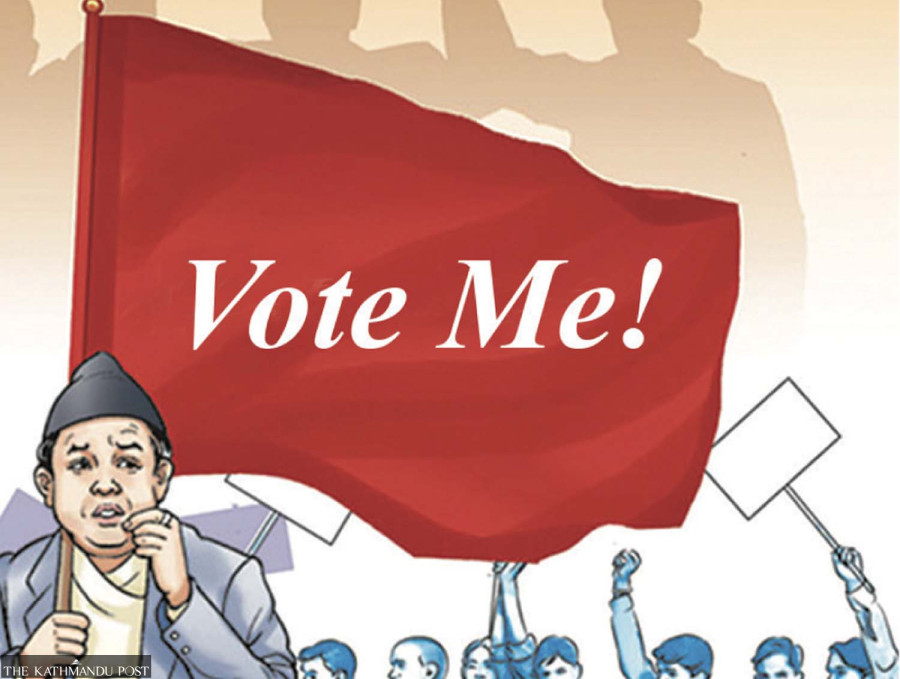Politics
How effective is door-to-door campaign?
Some candidates say it gives them a chance to convince voters, most others do it as a ritual.
Purushottam Poudel
Though political parties and their leaders have begun campaigning door-to-door as a part of their election strategy, whether that is an effective vote-getting strategy is open to debate.
On Sunday evening, Prakash Man Singh, a leader of the Nepali Congress and lower house candidate for Kathmandu-1, was busy campaigning in Dillibazar, Maitidevi and Anamnagar among other areas that fall in his constituency. The Post spoke to some of the voters Singh met during his campaign.
While some voters said they were pleased to see leaders visit their homes, others said they had already made up their mind. According to one voter the Post spoke to at Ghattekulo, the door-to-door campaigns would have little impact on voters when it came to candidate selection.
"If the leaders are capable of delivering when given the opportunity, there is no need for such campaigning," remarked Gyan Shrestha, a 72-year-old permanent resident of Kathmandu-1. "Such campaigns will have little influence on informed voters."
If so, why is the pattern repeated ahead of every election?
Former chief of the Public Service Commission Umesh Mainali said that candidates have no alternative to visiting door to door to maintain an interface with voters.
“Despite technology bringing people together, if leaders do not approach voters at election time, the general public gets annoyed. Therefore, door-to-door canvassing is still a must,” he said.
But Pramila Bidari, 43, a permanent resident of Dhumbarahi, which falls in Kathmandu-5 constituency, said people have little expectation from political parties and their leaders. “Whether or not they conduct door-to-door campaigns, we have nothing to do with them. We know that electoral promises are just lip service.”
Dikshya Shakya, 23, a permanent resident of Balkumari, Koteshwar area under Kathmandu-2, will be exercising her voting rights for the first time in the forthcoming federal and provincial elections. But the election campaigns being conducted by political parties have left her disenchanted.
“There is a clear sign that our candidates are outdated. In a technology-driven society, why are the candidates still following old ways of election campaigning, like going door-to-door?” said Shakya. “How can our leaders be sure people they meet will vote for them?”
Rather than visiting voters’ doors during the elections, leaders should be in constant communication with them, said Singh, the Nepali Congress leader.
"In the current digital age, we too are not confident about the effectiveness of such a campaign," Singh told the Post. “However, the door-to-door campaigns have remained a key component of electioneering."
Congress cadres accompanying Singh also claimed that such election campaigns are held because of compulsion. They said they already knew their voters but a door-to-door campaign was still unavoidable. They feared voters would otherwise change camps.
CPN-UML Senior Vice-Chair Ishwar Pokharel, who is contesting a lower house seat from Kathmandu-5, echoed Singh. However, he believes that these campaigns have persisted because people want candidates to come to their homes during their election campaigns.
"The thing that matters the most is the candidate’s constant communication with the public," Pokharel told the Post. "Traditional election campaigns cannot attract voters. However, it appears that the people want candidates to visit them at their homes during the elections. That is the reason why we keep doing this."
However, Maoist Centre leader Onsari Gharti Magar, who is contesting the federal election from Kathmandu-2, has a different take on the effectiveness of door-to-door campaigns.
“Though I agree that the effectiveness of such campaigns is declining, it is still a proven method to gauge our level of preparation and the areas we need to focus,” Magar, who is also a former Speaker, told the Post. “It allows us to understand voter psychology.”
"During the election campaign we saw that the voters want to see their candidates go door to door. Thus this is obviously an effective campaigning strategy," says Sobita Gautam, a lower house candidate of the National Independent Party who is contesting elections for the first time. The party has fielded her from Kathmandu-2.
Jagannath Lamichhane, an independent candidate from Kathmandu-5 (B) seat of the Bagmati provincial assembly who is also contesting the elections for the first time, however, criticised door-to-door campaigns.
"During door-to-door campaigns, there is no effective dialogue with voters," said Lamichhane.
He said while such campaigns were once considered effective in rural settings, in his urban constituency, a candidate needs at least six months to reach out to the people and learn about their grievances.
In a place like Kathmandu with high population density, it’s difficult for a candidate to establish such connections with voters, Lamichhane added.




 13.12°C Kathmandu
13.12°C Kathmandu














